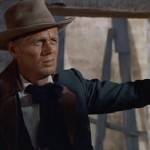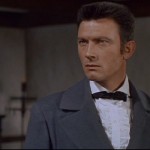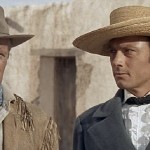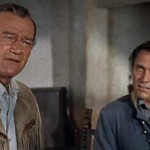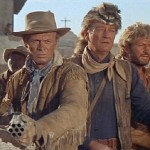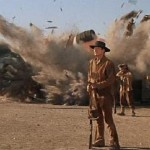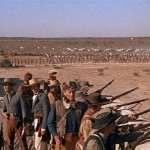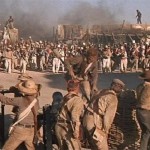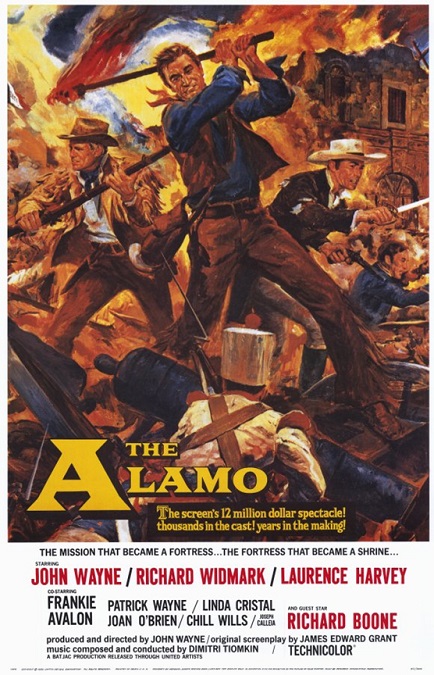
The Alamo – 1960
John Wayne is back once again, this time playing the famous historical figure, Colonel Davey Crockett. Alongside him is Colonel Jim Bowie, played by Richard Widmark, and Colonel Barrett Travis, played by Lawrence Harvey. These three men were the leaders of the doomed forces who were slaughtered at the Alamo Mission in 1836. The film, of course, is a dramatic telling of the story of the famous battle, and as such, finally explains why we should always, as the saying goes, “Remember the Alamo.”
Now, I’m no history buff, so I needed to do my research, just to see if the film told the true story, or if Hollywood got their meddlesome little hands on it and messed things up. So here’s the history lesson, according to the film: Travis is the commander of the Mission’s defending Texan troops. Bowie, arrives with some volunteer men of his own, and the two Colonels lock horns, disagreeing on nearly every point of command. Then Crockett arrives with his Tennessee men and gets caught in the middle of the feud. They are all there fighting for Texan independence from Mexico. The Mexican army is led by Gereralissimo Antonio Miguel Lopez de Santa Anna
Their plan is to hold out in the Alamo until the arrival of the reinforcements of Colonel James Fannin. However, when Fannin and his reinforcements are slaughtered by the Mexican army, under Santa Anna’s orders, the 187 men defending the Alamo are doomed to a quick death.
Why, then, did they stay, even when they knew that defeat and death were inevitable? What was the point in defending the Mission? What did their deaths accomplish? They bought General Sam Houston time to train an army of volunteers that could defeat Santa Anna’s troops. The men of the Alamo sacrificed their lives to give General Houston time to prepare his men to fight for the independence of Texas. Their sacrifices allowed Texas to win the war, and those brave and selfless sacrifices shouldn’t ever be forgotten. Remember the Alamo.
So, how accurate was the film? Apparently, according to Wikipedia, not very. Alamo historian Timothy Todish was quoted as saying, “There is not a single scene in The Alamo which corresponds to a historically verifiable incident”. Historians J. Frank Dobie and Lon Tinkle demanded their names be removed as historical advisors. However, I found that the changes were too insignificant to warrant complaint. For example, Wikipedia states that “Bowie did not brandish a six barrel volley gun, nor was he wounded in the leg during the final assault, nor did his wife die during the time of the siege. He fell ill due to typhoid fever and was barely awake during the final attack.” I say, who cares what kind of gun Bowie used except for Alamo historians? The six-barrel volley gun looked cool and gave his character the look of a butt-kicker! Plus the fact that he kept on trying to fight after his leg wound made him seem even tougher. The point is that he was out of the main battle, just like in reality. So, were the details completely accurate? No. But accurate enough? Yes.
The film also put a special and noticeable emphasis on freedom and the right of every man to make his own choices. This is not surprising, considering the film was written and directed by the epitome of American patriotism and pride, John Wayne. Fortunately, there were a few night-time raids, a few quick skirmishes, and the big final battle that helped stir the blood.
As for the acting, Wayne played Wayne and Widmark did a good enough job as a tragic figure. I ended up liking Harvey’s portrayal of Colonel Travis, though now that I am thinking about it, why would a Texan have a slightly British accent? However, I am baffled by the only actor in the film to be nominated for an Academy Award. Actor Chill Wills was nominated for Best Supporting Actor. He played the part of one of Crockett’s rowdy Tennessee volunteers. Huh? The character was annoying. I think he was supposed to be comic relief, but he had no dramatic scenes, no deep or insightful speeches. His only purpose was to behave like a drunken half-wit. Even his comic moments weren’t very funny. Best Supporting Actor? I don’t get it. I thought he was the weakest part of the film.
